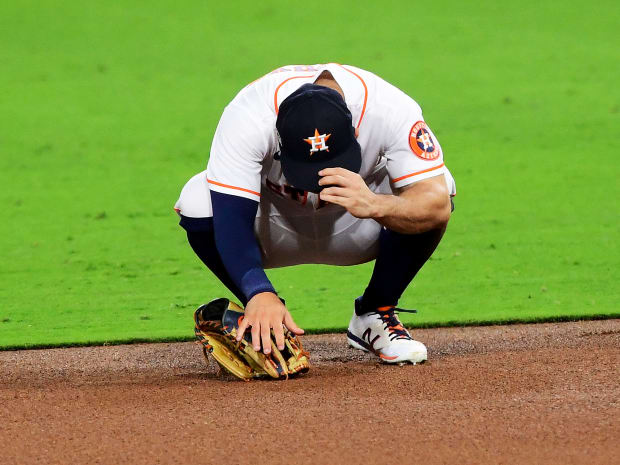Can Houston trust its second baseman at second base any longer?
SAN DIEGO — José Altuve watched in horror as the ball skittered past its target. He thrust his arms in the air. He crouched and stared vacantly at the infield dirt. He had lost control of another throw. He had lost control of another game.
He looked bereft. With no fans in the stands at Petco Park, his pain seemed to echo off the empty seats. He had bounced a throw by shortstop Carlos Correa, who was waiting at second base for the easy force out. Now the Rays had men on first and second with the cleanup hitter at the plate, and the Astros had no answers.
The other infielders gathered on the mound to await the pitching change that followed: Altuve had ended the night of the otherwise effective José Urquidy after 5+ innings. Altuve remained on the dirt between first and second base, alone but for the six iterations of his shadow that the stadium lights create. One by one, the other infielders approached him and offered encouragement. “Keep your head up,” Correa said. He could not induce a reply. None of them could.
Altuve stood silently, his lips pressed tightly together. He paced from the dirt to the grass and back. For the rest of the inning, he alternated between raking his hair with his hands and swiping at his eyes.
The Rays won the game 5–2. They lead the series three games to none. The Astros now face a must-win Game 4, followed, if they are lucky, by must-win Games 5, 6 and 7. And even if they can extend their season beyond Wednesday, they will confront a difficult question: Can they trust their second baseman at second base?

Manager Dusty Baker had speculated before the game that Altuve might have contracted the yips, the most feared disease in the sport: a sudden, baffling inability to do something easy. Any amateur golfer who has inexplicably yanked a putt knows the feeling. But most of those people do not battle themselves on national television.
After the game, Baker struggled to explain what was happening. Is this, in fact, the yips?
“I don’t know,” he said. “I really don’t know. It’s tough to see this happening to such a great player and such a great guy. I don’t know what it’s called.”
Perhaps no one but Altuve knows, and Altuve declined to speak with the media. But no one has suggested a physical problem, which leaves a mental one. The yips are a uniquely excruciating ailment. To be a professional athlete is to trust your body to do whatever you ask; when the simplest action becomes impossible, it feels like the ultimate betrayal. Former pitcher Brandon McCarthy, who suffered a case late in his career, called them “baseball cancer.” The metaphor is apt: Once the yips take root, they metastasize. Even if you can force them into remission, you always wonder if they will return.
McCarthy harbors as much reason as anyone to relish Altuve’s anguish: McCarthy played for the 2017 Dodgers, the team from whom Altuve’s cheating Astros stole the World Series. But even McCarthy does not root for this.
Altuve has historically been an adequate second baseman. He rarely makes the spectacular play but generally makes the routine one. He committed four errors this season, tied for third-most at his position. It is impossible to know for sure when doubt began to eat away at him, but the first time it seems to have affected a game came on Monday, in the bottom of the first inning.
Facing the left-handed Ji-Man Choi with two outs and a man on second, the Astros aligned themselves into their typical shift position: third baseman Alex Bregman halfway to second base, Correa, the shortstop, near the bag and Altuve in short right field. Choi, who was slower than 52 catchers this year, chopped a grounder to Altuve for an easy out. But Altuve bounced the throw, and first baseman Yuli Gurriel failed to pick it. Choi reached. The next batter, Manny Margot, hit a three-run home run. The Rays won the game 4–2.
Altuve committed almost an identical miscue two innings later, although Houston escaped the jam. He and Correa decided to switch positions, with Correa taking Altuve’s spot in short right field on shifts. Correa attributed the move to his superior range, but it seemed clearly related to Altuve’s struggles.
“You’ve gotta flush it and move on,” Baker said after that game, “Or else it multiplies.”
For a few moments on Tuesday, it seemed that Altuve had. He hit a solo home run in the first inning to give the Astros the lead. But three frames later, he made an awkward throw on a grounder, although Gurriel corralled the ball. And then came the sixth. “Boy, it was a nightmare inning,” said Baker with a sigh. Even after Altuve’s error, Baker thought his team might slip out of the frame when Randy Arozarena misread a single and held up at third. The next batter, Joey Wendle, lined a fastball at third baseman Alex Bregman, who got a glove on it but could not come down with the ball. Two runs scored. By the time it was over, five Rays had crossed the plate. Altuve hung his head after each one.
Correa blamed himself after the game, saying he should have made the pick. “I wasn’t able to pick my teammate up,” he said. He added, “I think he’s gonna bounce back from this.”
Altuve will get another chance in Game 4. Replacing him in the field “wouldn’t help us,” Baker said. “And it would certainly kill him.”